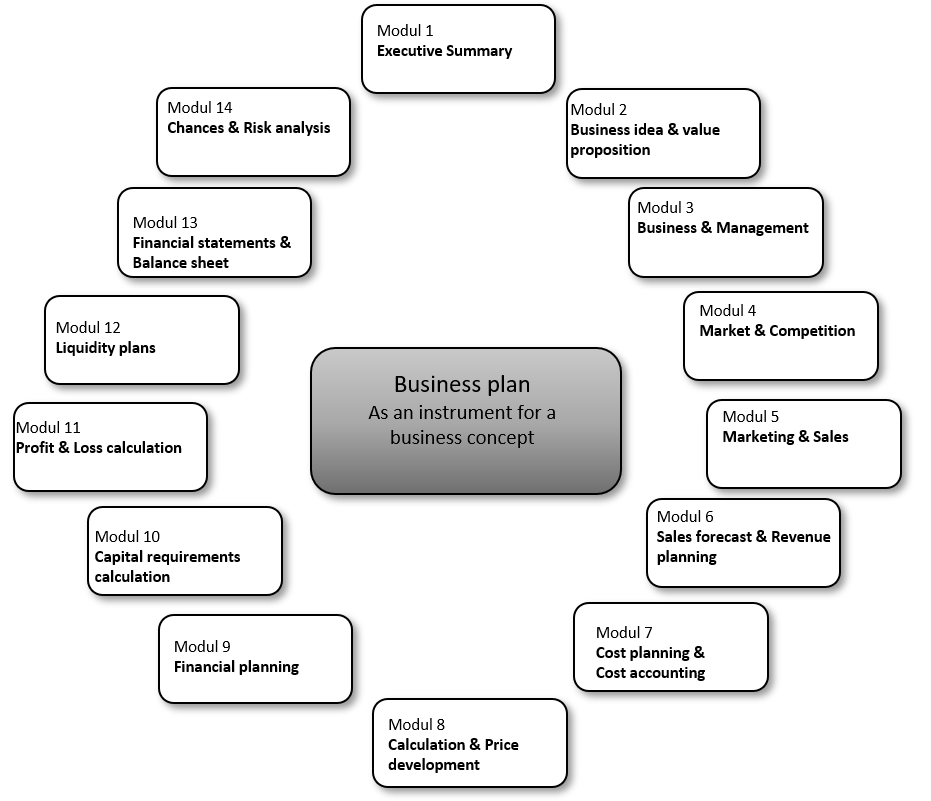1.4. Modules of the business plan
1.4. Modules of the business plan
The development of a business plan can be understood as a self-organising learning process for the founder. The development of the business plan consists of intellectual and practical work. It is not enough to simply read a book or copy a business idea. The person who seriously deals with a business idea and identifies with it has good prerequisites to be successful.
At the beginning, a business idea must emerge, which is developed piece by piece in a project description. In this way, the content and knowledge of the business grows with the way the business plan is thought about. The business idea should be discussed with friends, acquaintances and, of course, business partners. Market research is about looking at the location and the environment of the business on site. It is important to get a "feel" for the industry. Selling a perfume is mentally something completely different from selling a car or insurance. When working out the cost and finance plan, it is necessary to deal with commercial and business management issues. This is not to be done in isolation or only in a technical way, but with the inner systematics of the business idea and the rules of the game in the industry. It is not about abstract "figures" and "calculations", as in some case studies, but concretely related to the business that is to be involved. The individual components of a business plan are like communicating pipes; if one component is changed, it affects all the others. This creates complexity, which is more than the individual module.
For the practical implementation and development of the business plan, every founder (or student) should make a time plan. It is an instrument for the organised and systematic allocation of personal working time. The ability to self-manage time is possibly the most important competence that leads an entrepreneur to success.
The individual components of a business plan are presented below by means of modules, briefly explained and visualised by means of the knowledge map. The detailed explanations are given in chapters 2 - 4.

Fig: Knowledge map for business planning
Module 1: Executive Summary: Since a business plan is a business concept, it starts with a concise summary. The executive summary of the business plan can of course only be compiled at the end of the elaboration. For systematic reasons, however, this is presented first in the knowledge map.
Module 2: Business idea & value proposition: This is the technical core of the business plan. The business idea is the prerequisite for becoming an entrepreneur. You must look for a suitable business idea and decide with the business idea which products and services you want to offer or, formulated differently, which goods and offers you want to sell.
Module 3: Business & Management: If you know what products and services you want to sell, you need to think about how to offer them to customers. You need an organisation, you need staff. You need to set up a company and manage it.
Module 4: Market & Competition deals with the market structures and competitive conditions you need to investigate in order to successfully place your business in the market. You will learn the criteria you should use to conduct your market research from the perspective of the business idea. You will probably need the most time to complete the module, as you will have to look at the real conditions in the relevant industry on site. You need to collect market data, company data, competition data and general information that has an impact on your business. Supply and demand meet in the market.
Module 5: Marketing & Sales: If you have learned how the market works, you have learned a lot about the marketing of your competitors. In Module 5 - "Marketing & Sales" you will learn how to set up a marketing concept In planning, you must determine the many possibilities of the marketing mix concretely for your company. A successful marketing plan has direct effects on the sales forecast.
Module 6: Sales planning and forecasting: You need to forecast how many products or services customers will buy from you in a day, a week, a month, a year and finally three years. This is not about writing down wishful figures. You learn to make a realistic sales forecast.